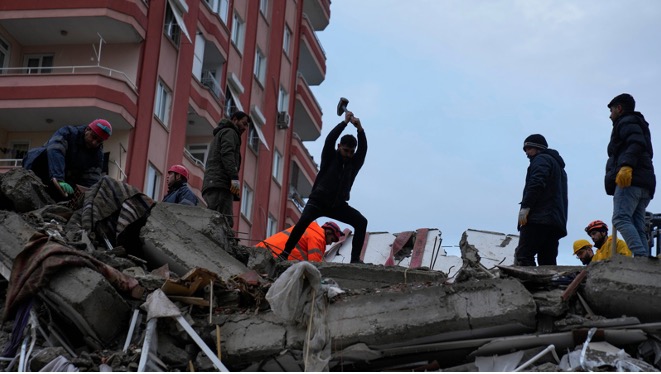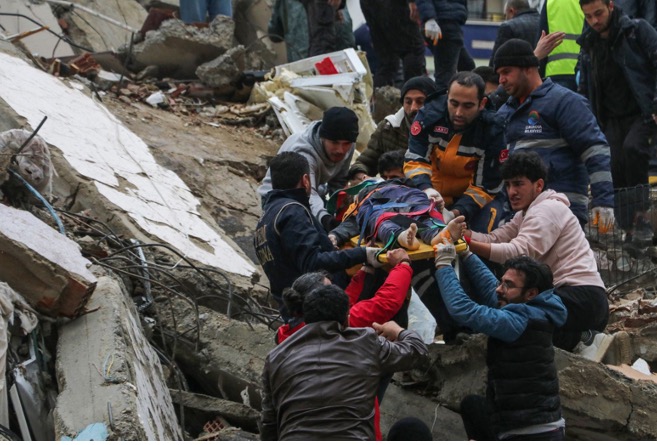Comments
GELFAND’S WORLD - The people who work on earthquake preparedness -- especially the volunteers -- are used to being ignored when it comes to the public response. Today, there is a horrible reminder.
It came in the form of a magnitude 7.8 earthquake that hit southern Turkey over the weekend. We are now starting to get the counts, in the form of the death toll, the number of injured, and a rough look at the number of buildings that were flattened by the shaking. Estimates on the dead are rising above 4000, and the estimate is that several thousand buildings have been destroyed. One particularly grim account refers to buildings where pancaked stories are all that are left.
The number of injured in Turkey alone is "several thousand" as of the most recent news stories coming out of the region.
The significance for Los Angeles dwellers? Remember that we are overdue for "The Big One," the predicted earthquake that would break along the San Andreas Fault. A major quake along this fault is predicted to be as much as magnitude 7.8 or even higher, which is right about what this week's Turkish quake was. Ours could even be worse by a few fractions of magnitude.

What would this do to the southern California area? There is lots of information, most of which is being ignored by the population as a whole, but here is just one explanation that you can follow. As the narration explains, we could have an immediate death toll nearing 2000 and perhaps twenty or thirty times that number of people who are injured. As the story explains, buildings constructed before about 1980 are particularly susceptible, but even some skyscrapers are at risk.
There is something you can do to prepare yourself. In this area, you can find future CERT classes here. I've been attending one of these classes and will have more to report at a later time.
The kinder news
We are not an ancient civilization, with structures that go back hundreds of years. We have the advantage that our dwellings were constructed according to building codes. Almost all of us would survive The Big One, but the aftermath could be brutal. And we should remember that older buildings, built to older codes, are not as stable as those built according to present regulations. There are still some soft story apartment buildings that have not yet been upgraded through seismic retrofits. And even the newest buildings won't protect everybody in the event of a violent quake that goes on for more than a minute. We can expect to see broken bones and head injuries, and an overworked and perhaps overwhelmed collection of first responders.
But the current guess is that only one in maybe five-thousand of us will be killed in a big quake, and the rest of us will be alive, if somewhat shaken both literally and figuratively. But as we have pointed out here, you had better have water and your medicines if you hope to be safe and comfortable. And you might think about having a few days' stock of canned food and a non-electric can opener.
The whole emergency preparedness effort was delayed by several years due to the Covid-19 epidemic, but it is starting to come back. At the very least, you can save some water -- several gallons at the minimum -- and you can think about the prescriptions you absolutely must have, both for yourselves and for your pets. And if you find yourself motivated by the Turkey disaster, you can sign up for that CERT class. Here's one hint about taking CERT: It sounds like a major effort since it extends over seven sessions (generally one each week), but I have not found it to be a chore. What CERT training does is to indoctrinate you into a system by which firefighters and a few trained volunteers can deal with the injured and coincidentally with whatever problems you yourselves may encounter at ground zero.
I will stop the sermon here. Either you will be motivated, or you won't be, and ultimately in a scenario where you are on your own, you will be more prepared or less prepared depending on what you do now, and next month, and perhaps over the next several years.
But one last suggestion. In the event of a major earthquake, you won't be able to jump to your feet and run out the door, nor should you. Exactly the opposite. You are advised to get your head and trunk under something protected -- a table perhaps -- and grab hold of it and just hang on until the shaking stops. There are brief summaries along the lines of "duck, cover, and hold on" which are designed to aim you properly in a moment of crisis. It's likely that every additional element of preparation you can engage in will make you that much safer, and able to withstand the aftermath of the big one.
(Bob Gelfand writes on science, culture, and politics for CityWatch. He can be reached at [email protected].)






